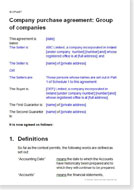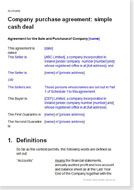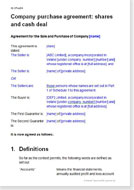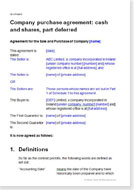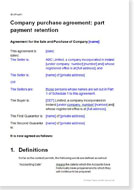Documents for use when you buy the company and not just the business out of it. These company sale agreements deal with a number of important company-related matters before moving on the more detailed area of warranties. Variants provide for all situations, from buying a single company in a low value transaction to buying a group of companies with real property where extensive warranties are crucial. If you are buying the business and not the shares in a company, you will need one of our business sale agreements.
Company sale agreement: group of companies
This is comprehensive agreement for the sale of purchase of a group of companies: two or more companies where one owns over 50% of the share capital of another.
The deal is for cash only.
The parent and the subsidiaries could operate in any industry – which could be the same as each other, or varied.
This is an authoritative agreement with additional and different warranties specifically suitable for the purchase of a group.
Company purchase agreement: simple cash deal
A comprehensive company sale agreement for sale of single company: with no real property; cash deal no shares, no retention; no additional sum; limited warranties
Company purchase agreement: shares and cash deal
This is a comprehensive sale agreement based on a simple deal for cash and an option for the seller to take shares in the buyer company.
Company purchase agreement: cash and shares, part deferred
This document deals with the purchase transaction where the seller gets mixture of cash and shares in the acquiring company.
The document includes a provision for an additional price to be paid if the profit warranted is met in current year. (Note: this is structured as an additional payment rather than retention out of the initial purchase price).
Company purchase agreement: part payment retention
Use this document template to buy a single company that has no subsidiaries.
The deal gives extra protection to the buyer: part of the payment for the shares is withheld and will be paid later, conditional on profit targets being met.
The document provides the option for the final price to be increased if the first year profit target is met. It also provides extra warranties related to real property.

If the document isn’t right for your circumstances for any reason, just tell us and we’ll refund you in full immediately.

We avoid legal terminology unless necessary. Plain English makes our documents easy to understand, easy to edit and more likely to be accepted.

You don’t need legal knowledge to use our documents. We explain what to edit and how in the guidance notes included at the end of the document.

Email us with questions about editing your document. Use our Lawyer Assist service if you’d like our legal team to check your document will do as you intend.

Our documents comply with the latest relevant law. Our lawyers regularly review how new law affects each document in our library.
Agreements to sell or purchase a company
Despite these agreements being more commonly called sale agreements, it is usually the buyer who proposes the document that forms the contract.
The reason is that while the seller is fully informed about the state of the target company, the buyer is not, and therefore it is the buyer who must insist on the terms that level the playing field.
However, there is no reason why the seller should not obtain an advantage by making the document his and editing in his favour before the buyer even sees it. Even if the buyer insists on changes, the negotiation is framed or influenced to the seller’s interest.
Each of these documents is very flexible, so you can negotiate from it and easily change the deal to what you want.
These agreements can be used for transactions of any value and companies operating in any industry. The business does not greatly affect the key commercial terms of the deal because what the buyer buys are shares, not assets. If the industry sector does affect the terms, you can easily add your industry-specific requirements.
The structure of the documents
The structure of each document is the same. The difference between one document and another relates only to the deal and payment.
All of the agreements assume some payment will be made immediately. The variants relate to:
- the full purchase price is paid at the closing date
- part of the price may be satisfied by the issue of new shares in the buying company
- part of the purchase price is retained by the buyer against warranted profit forecasts
- the seller receives an additional payment subject to profit in future years
- the deal involves sale of a group of companies
Completion of the deal
It is possible to create an agreement today that takes effect at a future date.
The problem with such a deal for the buyer is that the seller is left in charge of the running the business with no real incentive to look after it. By the time the buyer takes control, the business may not be what he expects.
The alternative is an immediate completion. The benefits are: immediate control for the buyer and reduced risk of conflict and misunderstanding with directors and employees.
Often the downside to immediate completion is that there may be some elements of the deal that cannot be finalised immediately.
However, for a company sale, there are likely to be far fewer issues because assets and existing contracts should already be in its name. In other words, there should be less to finalise.
These documents are drawn for immediate completion, but could easily be edited for a deferred handover.
Dealing with real property
The target company may or may not own land and buildings. In some cases, the property may be of greater value than all other business assets. However, since all property owned by it 'comes with the deal', you do not need to take any action at all to make sure the company still owns it after the sale has completed.
But what is very important is that you make the same checks on the property as you would make if you were buying it separately (for example, if it were an asset sale). This is an essential part of your due diligence. It is best to start with a surveyor’s report. In addition to all the usual inspections, ask him or her to tell you what is going on in the area that could reduce property values.
If the company is tenant of leasehold property read the lease carefully and ask your conveyancer to run over any problem areas with you.
Warranties
Warranties are the essence of the deal. They provide protection to the buyer, who does not have all of the information available to the seller.
It is normal, fair and reasonable for a buyer to demand warranties and for a seller to give them.
There is advantage in being the party who presents the first draft of the purchase and sale agreement. The reason is that the party who draws the document decides which warranties to include or exclude.
The buyer could include as many as possible, and force concessions on other points in return for removing a warranty that wasn’t particularly important to him. The seller could reduce the number considerably and hope that the buyer is not aware of what could be included.
Net Lawman document templates offer around 150 “full” warranties, or a reduced set of around 115. Either way, around 30 cover real property, so if your company has none, the number comes down.
A buyer should start with a full set unless he is sure he knows everything there is to know about his proposed acquisition, or the value is very small, or the business is not commenced. You can follow the drafting notes as to what to delete.
These sale and purchase agreements include a tax indemnity clause (also known as a tax covenant). This gives the buyers an indemnity for all pre-completion tax liabilities in the target company that wouldn't have otherwise arisen in the ordinary course of business (or provided for and disclosed in the accounts). Like others, tax warranties are beneficial for obtaining disclosure from the seller so that any issues or risks can be mitigated by using specific indemnities.
Disclosure letter
As well as warranties, we include a form of disclosure letter. This letter provides additional comfort to the buyer.
We provide example text so that you can see how they work and what style you could use. Your wording can be added easily.
Restricting competition
Each document includes appropriate provisions to prevent the seller from competing in business with the company you are about to buy.
We have provided that the seller may neither engage in a competitive business nor may he help someone else to do so.
Extensive drafting notes
Net Lawman drafting notes are acknowledged as the main tool to enable a document buyer to be his own legal draftsman.
For these sale contracts, the contribution of the notes is enormous. They extend to nearly 4,000 words, explaining everything you might need to know in plain English.
Shareholders’ agreements and articles of association of the company
If you are the seller and you are taking shares in the acquiring company as full or part payment, then it is essential that you enter into a new shareholders’ agreement with the buyer for the acquiring company.
If the buyer will not accept a fair agreement, you can be sure your new shares will be valueless.
Of course, it goes without saying that if more than one person is the buyer, then they too require a shareholders’ agreement for the company purchased to set down their exact arrangements for all of the many areas where agreement is so necessary.
There are a number of Net Lawman shareholders' agreements that could be used.
Your purchase will also present a good opportunity to update the articles of association of the company. As with a shareholders’ agreement you will find options for many areas you may not have considered at all.
Law and compliance
All these company sale agreements are drawn with an eye to the Companies Act 2014 as amended.
All rights reserved

